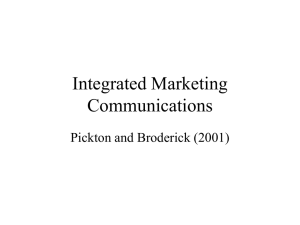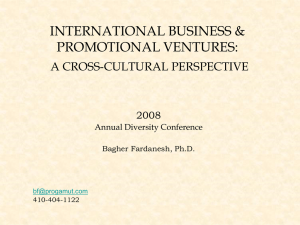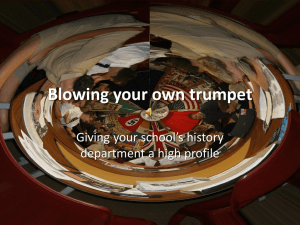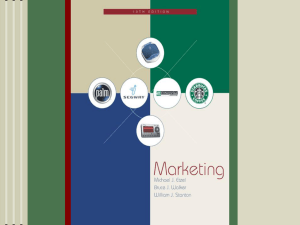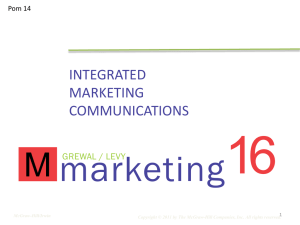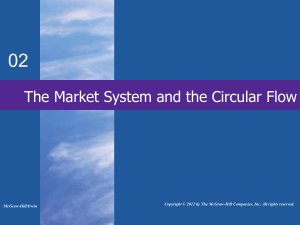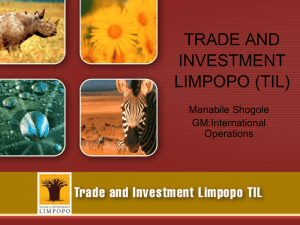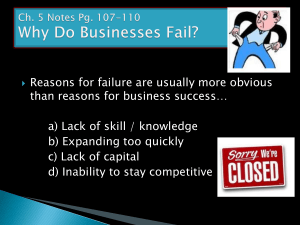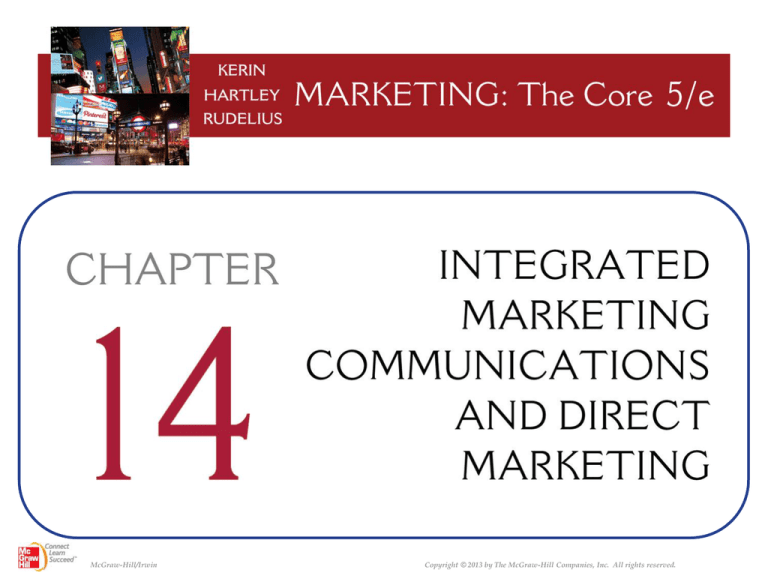
McGraw-Hill/Irwin
Copyright © 2013 by The McGraw-Hill Companies, Inc. All rights reserved.
LEARNING OBJECTIVES (LO)
AFTER READING CHAPTER 14, YOU SHOULD BE ABLE TO:
LO1
LO2
LO3
Discuss integrated marketing
communication and the
communication process.
Describe the promotional mix and
the uniqueness of each component.
Select the promotional approach
appropriate to a product’s target
audience, life-cycle stage, and channel
strategy.
14-2
LEARNING OBJECTIVES (LO)
AFTER READING CHAPTER 14, YOU SHOULD BE ABLE TO:
LO4
Describe the elements of the
promotion decision
process.
LO5
Explain the value of direct marketing
for consumers and sellers.
14-3
GET ENGAGED…IN THE TWITTERVERSE!
14-4
LO1
THE COMMUNICATION PROCESS
Promotional Mix
• Inform Prospective Buyers
• Persuade Them To Try
• Remind Them of the Benefits
Integrated Marketing
Communications (IMC)
14-5
FIGURE 14-1 The communication process
consists of six key elements
14-6
LO1
THE COMMUNICATION PROCESS
Communication
Source
Message
Channel of
Communication
Receivers
14-7
LO1
THE COMMUNICATION PROCESS
Field of Experience
Encoding
Feedback
Decoding
Response
Noise
Feedback Loop
14-8
LO1
The North Face Ad
Who is the source? What is the message?
How would you decode this ad?
14-9
FIGURE 14-2 The five elements of the
promotional mix
14-10
LO2
THE PROMOTIONAL ELEMENTS
ADVERTISING
Mass
Selling
Advertising
vs.
Customized
Interaction
• Paid Aspect
• Advantages
• Nonpersonal
• Disadvantages
14-11
LO2
THE PROMOTIONAL ELEMENTS
PERSONAL SELLING
Personal Selling
• Wasted Coverage
• Advantages
• Disadvantages
14-12
LO2
THE PROMOTIONAL ELEMENTS
PUBLIC RELATIONS
Public Relations
• Publicity
• Advantages
• Disadvantages
14-13
LO2
THE PROMOTIONAL ELEMENTS
SALES PROMOTION AND DIRECT MARKETING
Sales Promotion
• Advantages
• Disadvantages
Direct Marketing
• Advantages
• Disadvantages
14-14
LO2
IMC—DEVELOPING THE PROMOTIONAL MIX
THE TARGET AUDIENCE
Determine the Balance of the Elements
Coordinate the Promotional Effort
Assess Target Audience
Characteristics
• Consumers
• Businesses
14-15
MARKETING MATTERS
LO2
How Can You Reach Generation Y?
With Mobile Marketing!
14-16
LO3
IMC—DEVELOPING THE PROMOTIONAL MIX
THE PRODUCT LIFE CYCLE
Introduction Stage
Growth Stage
Maturity Stage
Decline Stage
14-17
FIGURE 14-3 Promotional tools used over
the product life cycle of Purina Dog Chow
14-18
LO3
IMC—DEVELOPING THE PROMOTIONAL MIX
CHANNEL STRATEGIES
Push Strategy
Pull Strategy
• Direct-to-Consumer
14-19
FIGURE 14-4 A comparison of push and
pull promotional strategies
14-20
FIGURE 14-5 The promotion decision
process includes planning, implementation,
and evaluation
14-21
LO4
DEVELOPING AN IMC PROGRAM
IDENTIFYING THE TARGET AUDIENCE
Target Audience
Behaviorial Targeting
14-22
LO4
DEVELOPING AN IMC PROGRAM
SPECIFYING THE PROMOTION OBJECTIVES
Hierarchy of Effects
• Awareness
• Trial
• Interest
• Adoption
• Evaluation
14-23
LO4
DEVELOPING AN IMC PROGRAM
SETTING THE PROMOTION BUDGET
Percentage of Sales Budgeting
Competitive Parity Budgeting
• Matching Competitors
• Share of Market
All-You-Can-Afford Budgeting
Objective and Task Budgeting
14-24
LO4
USING MARKETING DASHBOARDS
How Much Should You Spend on IMC?
Promotion-to-Sales Ratio
Total Promotion Expenditures ($)
100
Total Sales ($)
Promotion-to-Sales Ratio (%) =
14-25
LO4
DEVELOPING AN IMC PROGRAM
Selecting the Right
Promotional Tools
Designing the Promotion
Scheduling the Promotion
14-26
LO4
EXECUTING AND ASSESSING
THE PROMOTION PROGRAM
Pretesting
Posttesting
IMC Audit
14-27
LO5
DIRECT MARKETING
The Growth of Direct Marketing
The Value of Direct Marketing
• Direct Orders
Priceline Ad
• Lead Generation
• Traffic Generation
Technological, Global and
Ethical Issues in Direct Marketing
14-28
LO5
MAKING RESPONSIBLE DECISIONS
What Information Should Be Private”
Do-Not-Call
Do Not Mail
E-Privacy Directive
Do Not Track
DMA
14-29
VIDEO CASE 14
MOUNTAIN DEW: USING IMC AND
SOCIAL MEDIA TO CREATE AND
PROMOTE A NEW FLAVOR
14-30
FIGURE 1 The seven stages of the
Dewmocracy 2 campaign
14-31
VIDEO CASE 14
MOUNTAIN DEW
1. What changes in the environment
provided the opportunity for the
Dewmocracy approach?
14-32
VIDEO CASE 14
MOUNTAIN DEW
2. Which of the promotional
elements described in Figure
14-2 are used by Mountain Dew
in its Dewmocracy 2 campaign?
14-33
VIDEO CASE 14
MOUNTAIN DEW
3. What are some of the different
ways Mountain Dew can assess
the success of its campaign?
14-34
Promotional Mix
The promotional mix is the combination of
one or more communication tools used to:
(1) inform prospective buyers about the
benefits of the product, (2) persuade them
to try it, and (3) remind them later about the
benefits they enjoyed by using the product.
14-35
Integrated Marketing
Communications (IMC)
Integrated marketing communications
(IMC) is the concept of designing
marketing communications programs
that coordinate all promotional activities—
advertising, personal selling, sales
promotion, public relations, and direct
marketing—to provide a consistent
message across all audiences.
14-36
Communication
Communication is the process
of conveying a message to others
and that requires six elements:
a source, a message, a channel
of communication, a receiver,
and the processes of encoding
and decoding.
14-37
Advertising
Advertising is any paid form
of nonpersonal communication
about an organization, good,
service, or idea by an identified
sponsor.
14-38
Personal Selling
Personal selling consists of the
two-way flow of communication
between a buyer and seller, often
in a face-to-face encounter,
designed to influence a person’s
or group’s purchase decision.
14-39
Public Relations
Public relations is a form of
communication management that
seeks to influence the feelings,
opinions, or beliefs held by customers,
prospective customers, stockholders,
suppliers, employees, and other
publics about a company and its
products or services.
14-40
Publicity
Publicity is a nonpersonal,
indirectly paid presentation of an
organization, good, or service.
14-41
Sales Promotion
Sales promotion is a short-term
inducement of value offered to
arouse interest in buying a good
or service.
14-42
Direct Marketing
Direct marketing is a promotion
alternative that uses direct
communication with consumers
to generate a response in the
form of an order, a request for
further information, or a visit to
a retail outlet.
14-43
Push Strategy
A push strategy involves
directing the promotional mix to
channel members to gain their
cooperation in ordering and
stocking the product.
14-44
Pull Strategy
A pull strategy involves directing
the promotional mix at ultimate
consumers to encourage them
to ask the retailer for a product.
14-45
Hierarchy of Effects
The hierarchy of effects is the
sequence of stages a prospective
buyer goes through from initial
awareness of a product to eventual
action (either trial or adoption of the
product). The stages include
awareness, interest, evaluation,
trial, and adoption.
14-46
Direct Orders
Direct orders is the result of
direct marketing offers that
contain all the information
necessary for a prospective buyer
to make a decision to purchase
and complete the transaction.
14-47
Lead Generation
Lead generation is the result of
a direct marketing offer designed
to generate interest in a product
or service and a request for
additional information.
14-48
Traffic Generation
Traffic generation is the
outcome of a direct marketing
offer designed to motivate people
to visit a business.
14-49

